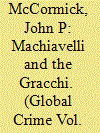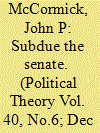|
|
|
Sort Order |
|
|
|
Items / Page
|
|
|
|
|
|
|
| Srl | Item |
| 1 |
ID:
153775


|
|
|
|
|
| Summary/Abstract |
T his article argues against prevailing scholarly trends that the Florentine Histories continues to delineate the ways through which Niccolò Machiavelli, in The Prince and the Discourses, advised potential founders or reformers to exploit, for their own benefit and that of their patria, the inevitable social conflicts between elites and the people that arise in all polities. Machiavelli demonstrates that, in particular, Giano della Bella and Michele di Lando could and should have attempted to imitate exemplary ancient founders and reformers whom he praises in previous works, especially Moses, Romulus, and Brutus. Machiavelli implicitly criticizes Giano and Michele for failing to spiritedly invigorate new laws with necessary and salutary violence; for neglecting to effectively manage the “envy” of rival peers; for not resisting the allure of “middle ways” between difficult political choices; and for failing to militarily organize or mobilize the entirety of Florence's common people.
|
|
|
|
|
|
|
|
|
|
|
|
|
|
|
|
| 2 |
ID:
092118


|
|
|
|
|
| Publication |
2009.
|
| Summary/Abstract |
In this article, I highlight a rhetorical strategy in Machiavelli's Discourses through which: (1) the Florentine endorses, despite appearances to the contrary, the redistributive agenda of the Brothers Gracchi, Roman tribunes frequently blamed for causing the collapse of the Republic; and (2) subtly intimates the violent means that other prospective reformers of republics must employ to succeed where the Gracchi had failed. Machiavelli invokes 'prudence' in his passages devoted to the Gracchi; following this lead, I accentuate the form of prudential rhetoric that he practices in such passages, and I point to the prudential form of violence he thought necessary if republics were to, in his words, 'keep the public rich, and the citizens poor'.
|
|
|
|
|
|
|
|
|
|
|
|
|
|
|
|
| 3 |
ID:
179002


|
|
|
|
|
| Summary/Abstract |
Leo Strauss, in Philosophy and Law (1935), offers Platonic theocracy as a more just and stable political alternative to both liberalism and authoritarianism. Rather than merely a scholastic investigation of medieval Jewish and Islamic philosophy, I read the book as a programmatic endorsement of a morally perfectionist political order: a divinely legitimated and rationally justified “true” or “beautiful” state. Since human beings require political community to suppress their evil inclinations and promote their disposition toward the good, Strauss criticizes liberalism for contending that government should remain neutral regarding good and evil and modern authoritarianism for effectively committing idolatry by politically instrumentalizing theology. I demonstrate that Strauss’s long-neglected book is particularly relevant for our own “postsecular age,” an age when adherents of religious orthodoxy increasingly demand concessions from liberal democracies and resurgent state authoritarianism frequently cloaks itself in religious trappings.
|
|
|
|
|
|
|
|
|
|
|
|
|
|
|
|
| 4 |
ID:
115734


|
|
|
|
|
| Publication |
2012.
|
| Summary/Abstract |
This article analyzes Machiavelli's accounts of the historical figures Agathocles, Clearchus, Appius and Pacuvius to (1) accentuate the Florentine's distinction between tyranny and civic leadership, (2) identify the proper place of elite punishment and popular empowerment in his conception of democratic politics, and (3) criticize contemporary Straussian and "radical" interpreters of Machiavelli for profoundly underestimating the roles that popular judgment and popular rule play within his political thought.
|
|
|
|
|
|
|
|
|
|
|
|
|
|
|
|
|
|
|
|
|